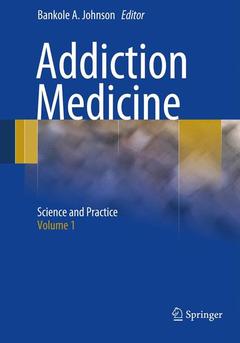Addiction Medicine, 2011 Science and Practice
Langue : Anglais
Coordonnateur : Johnson Bankole A.

The spectrum of addiction disorders presents practitioners with numerous challenges?among them the widening gap between a growing evidence base and the translation of this knowledge into treatment outcomes. Addiction Medicine addresses this disconnect, clearly explaining the role of brain function in drug taking and other habit-forming behaviors, and applying this biobehavioral framework to the delivery of evidence-based treatment. Its state-of-the-art coverage provides clinically relevant details on not only traditional sources of addiction such as cocaine, opiates, and alcohol, but also more recently recognized substances of abuse (e.g., steroids, inhalants) as well as behavioral addictions (e.g., binge eating, compulsive gambling, hoarding). Current behavioral and medical therapies are discussed in depth, and the book?s close attention to social context gives readers an added lens for personalizing treatment. An international panel of expert contributors offers the most up-to-dateinformation on: Diagnosis and classification Neurobiological and molecular theories of addiction Behavioral concepts of addiction Clinical aspects of addiction to a wide range of substances, including opiates, stimulants, sedatives, hallucinogens, alcohol, nicotine, and caffeine Science-based treatment options: pharmacotherapy, pharmacogenetics, potential vaccines, brief and compliance-enhancing interventions, cognitive behavioral treatment, behavioral management, and other psychosocial interventions Behavioral addictions?including compulsive eating, Internet messaging, and hypersexuality?and their treatment Addiction in specific populations, including adolescents, the elderly, pregnant women, and health care professionals Legal, disability, and rehabilitation issues At once comprehensive and integrative, Addiction Medicine is an essential text and a practice-expanding tool for psychiatrists, health psychologists, pharmacologists, social workers, drug counselors, trainees, and general physicians/family practitioners.
I. History, Perspectives, Epidemiology, Diagnosis, and Classification.- 1 Emerging Health Perspectives.- 2 The Epidemiology of Alcohol and Drug Disorders.-3 United States Federal Drug Policy .-4. Historical Perspectives of Addiction.- 5 Diagnosis and Classification of Substance Use Disorders.- II. Behavioral Theories for Addiction.- 6 Drug Reinforcement in Animals.- 8 Conditioning of Addiction.- III. Genetic and Other Biological Theories for Addiction.- 9 Mouse Models: Knockouts/Knockins.- 10 Vulnerability to Substance Abuse.- 11 The Pharmacogenomics of Addiction.- 12 Metabolomics in Drug Response and Addiction.- 13 Neurobiological Basis of Drug Reward and Reinforcement.- 14 Neurobehavioral Toxicology of Substances of Abuse.- 15 Animal Models of Drug Dependence: Motivational Perspective.- 16 Novel Methodologies: Proteomic Approaches in Substance Abuse Research.- IV. Clinical Aspects of Alcohol and Drug Addiction.- 17 Alcohol: Clinical Aspects.- 18 Cocaine.- 19 Nicotine.- 20 Marijuana: An Overview of the Empirical Literature.- 21 Opiates and Prescription Drugs.- 22 Clinical Aspects of Methamphetamine.- 23 Sedative-Hypnotics and Anxiolytics.- 24 Clinical Aspects of Inhalant Addiction.- 25 Anabolic-Androgenic Steroids.- 26 Caffeine.- 27 Serotonergic Hallucinogens.- 28 Ketamine and Phencyclidine.- V. Behavioral Addictions and Treatment.- 29 The Biology and Treatment of Pathological Gambling.- 30 An Addiction Model of Binge Eating Disorder.- 31 Compulsive Buying.- 32 Sexual Behavior as an Addictive or Compulsive Phenomenon.- 33 Instant Messaging Addiction Among Teenagers: Abstracting from the Chinese Experience.- 34 Hoarding as a Behavioral Addiction.- VI. Treatment and Application: Behavioral Treatments.- 35 Motivational Interviewing.- 36 Cognitive Behavioral Therapy for Addiction.- 37 Community Reinforcement Approach and Contingency.- 38 Relapse Prevention and Recycling in Addiction.- 39 Brief Interventions for the Treatment of Alcohol or OtherDrug Addiction.- 40 Self-Help Approaches for Addictions.- VII. Treatment and Application: Group Treatments and Specific Settings.- 41 Community Clinics.- 42 Unhealthy Alcohol and Drug Use in Primary Care.- 43 Criminal Justice System and Addiction Treatment.- 44 Adolescent Neurocognitive Development and School-Based Drug Abuse Prevention and Treatment.- 45 The Therapeutic Community for Drug Abuse Treatment: A Journey Yet Unfolding in the Recovery Movement.- 46 Substance Use-Focused Self-Help Groups: Processes and Outcomes.- VIII. Treatment and Application: Pharmacotherapy.- 47 Pharmacotherapy for Alcoholism and Some Related Psychiatric and Addictive Disorders: Scientific Basis and Clinical Findings.- 48 Alcohol Withdrawal: Treatment and Application.- 49 Nicotine.- 50 Pharmacotherapy of Cocaine Addiction.- 51 Opioids: Heroin and Prescription Drugs.- 52 Methamphetamine.- 53 Potential Pharmacotherapies for Cannabis Dependence.- 54 Hallucinogens.- IX. Molecular Genetics, Alternative Therapies, and Other Topics in the Treatment of Addiction.- 55 Molecular Genetics and the Treatment of Addiction.- 56 Physical Considerations for Treatment Complications of Alcohol and Drug Use and Misuse.- 57 Pain and Addiction.- 58 The Triple Threat: Mental Illness, Substance Abuse, and the Human Immunodeficiency Virus.- 59 Substance Use Stigma as a Barrier to Treatment and Recovery.- 60 Religiousness, Spirituality, and Addiction: An Evidence-Based Review.- 61 Ear Acupuncture in Addiction Treatment.- X. Computer Modeling.- 62 In Silico Models of Alcohol Kinetics: A Deterministic Approach.- 63 In Silico Models of Alcohol Dependence Treatment: Stochastic Approach.- 64 Dynamic and Systems-Based Models for Evaluating Hypotheses Related to Predicting Treatment Response.- XI. Dependence in Specific Populations.- 65 Enhancing Positive Outcomes for Children of Substance-Abusing Parents.- 66 Vulnerability to Addictive Disorders and Substance Abuse in Adolescence and Emerging Adulthood.-67 Alcohol and Substance Abuse in African Americans.- 68 Gays, Lesbians, and Bisexuals.- 69 Substance Use Disorders in Health Care Professionals .- 70 Identification and Treatment of Alcohol or Drug Dependence in the Elderly.- 71 Alcohol and Drugs of Abuse in Pregnant Women: Effects on the Fetus and Newborn, Mode of Action, and Maternal Treatment.- XII. Legal, Disability, and Rehabilitative Issues.- 72 Forensic Issues.- 73 Disability and Addiction.- 74 The Homeless .- XIII. New Vistas .- 75 To Open Up New Vistas in Basic and Preclinical Addiction Research.- 76 Opportunities, Challenges, and Successes in the Development of Medicines for the Treatment of Addiction
Bankole A. Johnson, D.Sc., M.D., is a Professor of Psychiatry and Neurobehavioral Sciences, Medicine, and Neuroscience at the University of Virginia, Charlottesville, VA, USA.
Presents a conceptual framework for understanding the underpinnings of addiction Covers the state-of-the-art treatments as they apply to addictive behaviors Contributions from an international panel of addiction experts Includes supplementary material: sn.pub/extras
Ouvrage de 1633 p.
17.8x25.4 cm
Ouvrage de 1633 p.
17.8x25.4 cm
Thèmes d’Addiction Medicine :
© 2024 LAVOISIER S.A.S.



